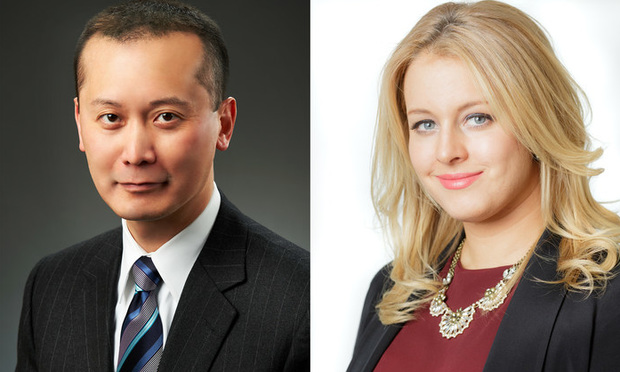 Edward T. Kang, left, and Kandis Kovalsky, right, of Kang Haggerty.
Edward T. Kang, left, and Kandis Kovalsky, right, of Kang Haggerty. When Is Knowing 'Knowing' in FCA Cases? High Court Examines Two Cases
The Supreme Court is taking up two U.S. Court of Appeals for the Seventh Circuit cases where rulings shielded both food-and-pharmacy chains from FCA liability for alleged improper billing involving prescription drugs. If the high court sides with the Seventh Circuit, the impending result could mean an exponential loss of taxpayer money.
April 13, 2023 at 10:56 AM
10 minute read
The knowledge of falsity element in False Claims Act (FCA) cases—i.e., whether fraudulent claims were submitted knowingly, not merely negligently, may soon become an objective standard regardless of the defendant's actual knowledge. The Supreme Court is taking up two U.S. Court of Appeals for the Seventh Circuit cases where rulings shielded both food-and-pharmacy chains from FCA liability for alleged improper billing involving prescription drugs. If the high court sides with the Seventh Circuit, the impending result could mean an exponential loss of taxpayer money.
Under the FCA, "any person who knowingly submits a false claim to the government or causes another to submit a false claim to the government or knowingly make a false record or statement to get a false claim paid by the government" may be held liable. The term "knowingly" anticipates a knowledge requirement such that a person who simply submits a false claim to the government without the knowledge of falsity does not violate the act. Rather, they must have submitted such a claim with knowledge of the falsity or "scienter." As laid out in Section 3729(b)(1), the FCA's standard for scienter only allows liability when fraud occurs with actual knowledge; deliberate ignorance of the truth or falsity of the information, or; reckless disregard of the truth or falsity of the information. In recent years, courts have struggled with interpreting the scienter element, especially where FCA defendants assert an objectively reasonable alternative interpretation of an ambiguous statute to justify their conduct.
This content has been archived. It is available through our partners, LexisNexis® and Bloomberg Law.
To view this content, please continue to their sites.
Not a Lexis Subscriber?
Subscribe Now
Not a Bloomberg Law Subscriber?
Subscribe Now
NOT FOR REPRINT
© 2025 ALM Global, LLC, All Rights Reserved. Request academic re-use from www.copyright.com. All other uses, submit a request to [email protected]. For more information visit Asset & Logo Licensing.
You Might Like
View All
Pa. Defense Firm Sued by Client Over Ex-Eagles Player's $43.5M Med Mal Win
3 minute read


Court Sanctions Attorney $7.5K for Filing Repeated Erroneous Complaints
5 minute readLaw Firms Mentioned
Trending Stories
- 1Uber Files RICO Suit Against Plaintiff-Side Firms Alleging Fraudulent Injury Claims
- 2The Law Firm Disrupted: Scrutinizing the Elephant More Than the Mouse
- 3Inherent Diminished Value Damages Unavailable to 3rd-Party Claimants, Court Says
- 4Pa. Defense Firm Sued by Client Over Ex-Eagles Player's $43.5M Med Mal Win
- 5Losses Mount at Morris Manning, but Departing Ex-Chair Stays Bullish About His Old Firm's Future
Who Got The Work
J. Brugh Lower of Gibbons has entered an appearance for industrial equipment supplier Devco Corporation in a pending trademark infringement lawsuit. The suit, accusing the defendant of selling knock-off Graco products, was filed Dec. 18 in New Jersey District Court by Rivkin Radler on behalf of Graco Inc. and Graco Minnesota. The case, assigned to U.S. District Judge Zahid N. Quraishi, is 3:24-cv-11294, Graco Inc. et al v. Devco Corporation.
Who Got The Work
Rebecca Maller-Stein and Kent A. Yalowitz of Arnold & Porter Kaye Scholer have entered their appearances for Hanaco Venture Capital and its executives, Lior Prosor and David Frankel, in a pending securities lawsuit. The action, filed on Dec. 24 in New York Southern District Court by Zell, Aron & Co. on behalf of Goldeneye Advisors, accuses the defendants of negligently and fraudulently managing the plaintiff's $1 million investment. The case, assigned to U.S. District Judge Vernon S. Broderick, is 1:24-cv-09918, Goldeneye Advisors, LLC v. Hanaco Venture Capital, Ltd. et al.
Who Got The Work
Attorneys from A&O Shearman has stepped in as defense counsel for Toronto-Dominion Bank and other defendants in a pending securities class action. The suit, filed Dec. 11 in New York Southern District Court by Bleichmar Fonti & Auld, accuses the defendants of concealing the bank's 'pervasive' deficiencies in regards to its compliance with the Bank Secrecy Act and the quality of its anti-money laundering controls. The case, assigned to U.S. District Judge Arun Subramanian, is 1:24-cv-09445, Gonzalez v. The Toronto-Dominion Bank et al.
Who Got The Work
Crown Castle International, a Pennsylvania company providing shared communications infrastructure, has turned to Luke D. Wolf of Gordon Rees Scully Mansukhani to fend off a pending breach-of-contract lawsuit. The court action, filed Nov. 25 in Michigan Eastern District Court by Hooper Hathaway PC on behalf of The Town Residences LLC, accuses Crown Castle of failing to transfer approximately $30,000 in utility payments from T-Mobile in breach of a roof-top lease and assignment agreement. The case, assigned to U.S. District Judge Susan K. Declercq, is 2:24-cv-13131, The Town Residences LLC v. T-Mobile US, Inc. et al.
Who Got The Work
Wilfred P. Coronato and Daniel M. Schwartz of McCarter & English have stepped in as defense counsel to Electrolux Home Products Inc. in a pending product liability lawsuit. The court action, filed Nov. 26 in New York Eastern District Court by Poulos Lopiccolo PC and Nagel Rice LLP on behalf of David Stern, alleges that the defendant's refrigerators’ drawers and shelving repeatedly break and fall apart within months after purchase. The case, assigned to U.S. District Judge Joan M. Azrack, is 2:24-cv-08204, Stern v. Electrolux Home Products, Inc.
Featured Firms
Law Offices of Gary Martin Hays & Associates, P.C.
(470) 294-1674
Law Offices of Mark E. Salomone
(857) 444-6468
Smith & Hassler
(713) 739-1250





